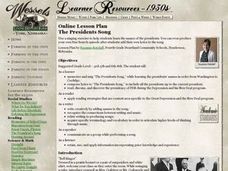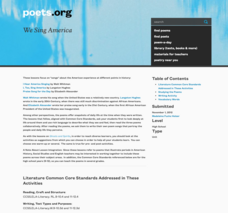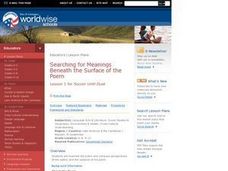National Endowment for the Humanities
“The Great Migration” by Minnie Bruce Pratt
Minnie Bruce Pratt's poem, "The Great Migration," offers young scholars an opportunity to reflect on how where we come from influences who we are. Groups conduct a close reading of the poem, recording observations about the poem's...
Weber County Library
Abstract Ideas Explored: Writing with Extended Metaphor
A 25-page packet includes eight detailed lesson plans centered around poems by Emily Dickinson. Each lesson begins with a burning question that students attempt to answer by using evidence from Dickinson's poems.
National Endowment for the Humanities
“Every Day We Get More Illegal” by Juan Felipe Herrera
A study of Jan Felipe Herrera's poem "Every Day We Get More Illegal" opens the door for a discussion on immigration. To begin, class members examine the photograph "Desert Survival," record their observations of the image, and then...
EngageNY
Introducing “If” and Noting Notices and Wonders of the First Stanza
After reading chapter 14 of the story Bud, Not Buddy by Christopher Paul Curtis, scholars take part in a read-aloud of the poem If by Rudyard Kipling and compare it to the reading of Bud, Not Buddy. Learners then go deeper into the poem...
EngageNY
Notices, Wonders, and Vocabulary of the Third Stanza of “If”
How does one's experience reading a poem's text differ from listening to its audio version? Delve into the insightful question with the poem, If by Rudyard Kipling, as pupils compare and contrast their experience using a note-taking...
EngageNY
Looking Closely at Stanza 3—Identifying Rules to Live By Communicated in “If”
Just as Bud, from the novel Bud, Not Buddy by Christopher Paul Curtis, had rules to live by, so does the poem, If by Rudyard Kipling, but how do the two relate? Pupils delve deep into the poem's third stanza, participate in a grand...
Curated OER
The Presidents Song
Remember learning to spell “encyclopedia” by singing along with Jiminy Cricket? How about using a singing exercise to learn the names of the presidents? “The Presidents Song,” includes the names, in order, from Washington to Coolidge....
Curated OER
Poetry in Song
Have your music lovers examine song lyrics and identify the poetry elements or tools used by a lyricist. They review the song individually before working in groups to discuss what they discovered about the song's narrator or character...
Academy of American Poets
We Sing America
Pair the famous poems "I Hear America Singing," by Walt Whitman, and "I, Too, Sing America," by Langston Hughes, with a more recent poem by Elizabeth Alexander called "Praise Song for the Day" to demonstrate a theme and introduce your...
Curated OER
Writing and Autobiography
Are you working on an autobiographical or narrative writing unit? Bring this lesson to your class, as it takes young writers through the process of drafting and sequencing an autobiography. After observing and demonstrating steps of the...
Curated OER
Playing Vocabulary Basketball
Learners view a slide show featuring famous athletes and educational institutions that have played a part in the history of basketball. They participate in a game in which a basketball is tossed from person to person as facts and...
Curated OER
Searching for Meanings Benath the Surface of the Poem
Students read "Soccer Until Dusk". As a class, they discuss the various settings and actions in the poem and discuss the life in Guatemala and compare it with the United States. To end the lesson plan, they complete a journal...
Curated OER
Unit Plan for Mark Twain and American Humor
Students create brochures about the humor of Mark Twain. In this literature-analysis lesson plan, students read "The Celebrated Jumping Frog of Calaveras County" and other short stories by Twain. Students write analytical paragraphs and...
Echoes & Reflections
The "Final Solution"
Nazi policies shifted from deportation and imprisonment to extermination of the Jewish people in death camps in the "Final Solution." Learners examine photos of artifacts, read poetry written by survivors, analyze testimony from...
Scholastic
Reading Poems From the Academy of American Poets Chancellors
Start a lesson on poetic voice with a peer to peer discussion on what characterizes the strength in the voice with which a writer chooses to express himself/herself. In pairs, readers are tasked with reading and creating T-charts for...
Scholastic
Selecting Favorite Poems From Historical Poets
Here is a poetry lesson that begins with a free-association activity focused on the word voice. Learners each sit alone for a moment and make sounds that express how they are currently feeling, and then turn to their partners to share...
Curated OER
Letters from Emily Dickinson: Letters and Poems
Students analyze how Emily Dickinson perceived herself as a poet. Students read correspondence between Dickinson and her preceptor, Mr. Higginson to determine the depths of their relationship. Students interpret several of her poems.
Curated OER
The Learning Network: Poetry Pairing July, 21, 2011
Although not a complete lesson plan, this set of emotionally powerful texts could be used in a variety of lessons. From The New York Times' Learning Network site, the resource includes a poem, an excerpt from a New York Times article and...
Alabama Learning Exchange
Edgar Allan Poe's Journey Through Life and Literature
How was Edgar Allan Poe able to create "intriguing, memorable, and lasting literature"? To answer this question, learners analyze the syntax, diction, and characterizations in Poe's poems and short stories and compare the impact of these...
Angel Island Immigration Station Foundation
Conditions in China: Why Might One Leave Home Forever?
Primary source texts provide scholars with the background information they need to understand why Chinese peasant farmers were driven to emigrate. After underlining keywords, phrases, and/or lines in the texts, individuals craft a...
Curated OER
Discovering Angel Island: The Story Behind the Poems
Students watch a video titled Discovering Angel Island: The Story Behind the Poems about immigrants that came through Angel Island. In this Angel Island lesson plan, students respond with a journal entry.
Scholastic
Lesson Two: The Earth, Introductory Activities
Determine what young pupils already know about earth science with a brainstorming activity. After class members work together to complete a KWL chart about the Earth, they craft an acrostic poem to demonstrate their understanding.
Curated OER
Using Prepositional Phrases
The class reads the book Heckedy Peg. Stopping to point out the prepositional phrases, the teacher models and guides the young scholars to deeper comprehension. Small groups collaborate to read A Sweet Smell of Roses. They thenfind the...
Curated OER
Henry Wadsworth Longfellow's Christmas Bells
Learners read and analyze the anti-slavery poem, "Christmas Bells" by Henry Wadsworth Longfellow. They discuss the content and form of the poem, write an essay, write an original poem, examine how this anti-slavery poem was converted...

























